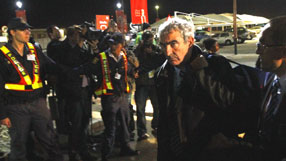
The best features, fun and footballing quizzes, straight to your inbox every week.
You are now subscribed
Your newsletter sign-up was successful
Want to add more newsletters?

Five times a week
FourFourTwo Daily
Fantastic football content straight to your inbox! From the latest transfer news, quizzes, videos, features and interviews with the biggest names in the game, plus lots more.

Once a week
...And it’s LIVE!
Sign up to our FREE live football newsletter, tracking all of the biggest games available to watch on the device of your choice. Never miss a kick-off!
Join the club
Get full access to premium articles, exclusive features and a growing list of member rewards.
There was nothing noble about the revolution staged by players after one of their number, Nicolas Anelka, was kicked off the squad for insulting coach Raymond Domenech.
This had nothing to do with thrilling moves, midfield wizards or panache but was all about bickering within a side frustrated by their incapacity to restore their battered pride.
France were desperate to avoid a repeat of their Euro 2008 flop, when internal squabbling had marred a dismal campaign that also ended after the group stage.
Instead they did much worse, faring just as poorly on the pitch but also creating a scandal of unprecedented proportions for all the wrong reasons.
To justify their protest against the French Football Federation's decision to send Anelka home, the players said the incident was their problem and should have remained secret.
Patrice Evra, who lost the captain's armband and his place in the starting line-up after the revolt, blamed the press for printing Anelka's insults and denounced a "traitor" within the team who had leaked them to the media.
Domenech, who has been jeered by the France fans for years with his side lining up uninspiring performances, first said he could understand Anelka and only blamed him for having refused to apologise.
The best features, fun and footballing quizzes, straight to your inbox every week.
GROWING DISCREPANCY
Then, after the outcry caused by the players' decision to boycott a public training in support of Anelka, he said the FFF had done the right thing by kicking out the striker.
The entire saga, during which French Sports Minister Roselyne Bachelot was dispatched to address the warring parties and try to galvanise wobbly troops, provided a symbol for a growing discrepancy between the team and the outside world.
Perceived as distant if not arrogant by both the France fans and local media, the players said they had been hurt by what they regarded as constant and unfair criticism.
Their lacklustre displays on the pitches of South Africa, obviously, did not help, and nor did Domenech's failure to earn their respect or come up with a coherent playing system.
A senior FFF official said three or four players now clearly past their prime had dictated their law to the whole group while media reports suggested some isolated players had tried to convince the leaders that the boycott was not a good idea.
The team's feeling of helplessness and the glaring absence of a magician to inspire them the way the great Zinedine Zidane used to increased the players' frustration and contributed it to their implosion.
With nothing left but a field of ruins, Laurent Blanc, who will now replace Domenech, needs to rebuild everything.
Finding artists worthy of the proud French tradition is the place to start but a debate on who the France team belong to and what it means to wear their blue colours seems just as necessary.
 Join The Club
Join The Club










